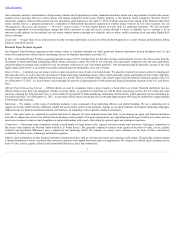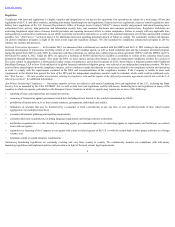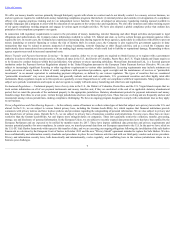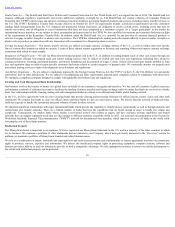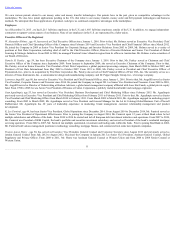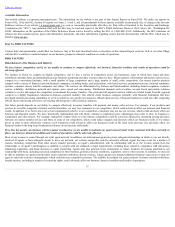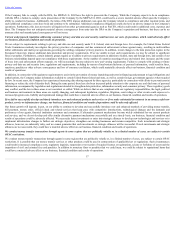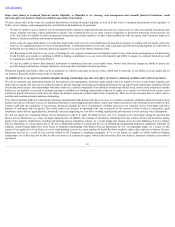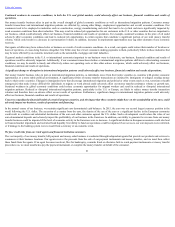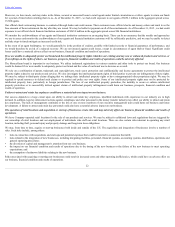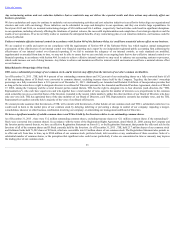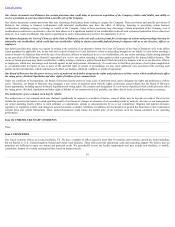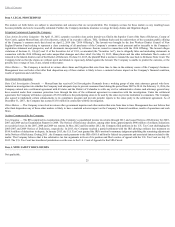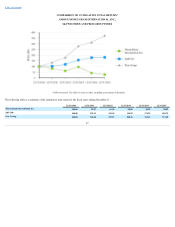MoneyGram 2015 Annual Report Download - page 18
Download and view the complete annual report
Please find page 18 of the 2015 MoneyGram annual report below. You can navigate through the pages in the report by either clicking on the pages listed below, or by using the keyword search tool below to find specific information within the annual report.
Table of Contents
If the Company fails to comply with the DPA, the MDPA/U.S. DOJ have the right to prosecute the Company. While the Company expects to be in compliance
with the DPA, a failure to comply, and a prosecution of the Company by the MDPA/U.S. DOJ, could lead to a severe material adverse effect upon the Company’s
ability to conduct its business. Additionally, the terms of the DPA impose additional costs upon the Company related to compliance and other required terms, and
such additional compliance costs have been and continue to be substantial. Additional compliance obligations could also have an adverse impact on the Company's
operations. Furthermore, this does not resolve all inquiries from other governmental agencies such as FinCEN, which could result in additional costs, expenses and
fines. The Company does not anticipate material adverse consequences from entry into the DPA on the Company’s reputation and business, but there can be no
assurance that such unanticipated consequences will not occur.
Current and proposed regulation addressing consumer privacy and data use and security could increase our costs of operations, which could adversely affect
our business, financial condition and results of operations.
We are subject to requirements relating to privacy and data use and security under U.S. federal, state and foreign laws. For example, the United States Federal
Trade Commission routinely investigates the privacy practices of companies and has commenced enforcement actions against many, resulting in multi-million
dollar settlements and multi-year agreements governing the settling companies' privacy practices. In addition, recent changes to the data protection regime in the
European Union may impose additional data protection and privacy requirements. If we are unable to meet such requirements, we may be subject to significant
fines or penalties. Furthermore, certain industry groups require us to adhere to privacy requirements in addition to federal, state and foreign laws, and certain of our
business relationships depend upon our compliance with these requirements. As the number of countries enacting privacy and related laws increases and the scope
of these laws and enforcement efforts expands, we will increasingly become subject to new and varying requirements. Failure to comply with existing or future
privacy and data use and security laws, regulations and requirements, including by reason of inadvertent disclosure of personal information, could result in fines,
sanctions, penalties or other adverse consequences and loss of consumer confidence, which could materially adversely affect our business, financial condition and
results of operations.
In addition, in connection with regulatory requirements to assist in the prevention of money laundering and terrorist financing and pursuant to legal obligations and
authorizations, the Company makes information available to certain United States federal and state, as well as certain foreign, government agencies when required
by law. In recent years, the Company has experienced increasing data sharing requests by these agencies, particularly in connection with efforts to prevent terrorist
financing or reduce the risk of identity theft. During the same period, there has also been increased public attention to the corporate use and disclosure of personal
information, accompanied by legislation and regulations intended to strengthen data protection, information security and consumer privacy. These regulatory goals
may conflict, and the law in these areas is not consistent or settled. While we believe that we are compliant with our regulatory responsibilities, the legal, political
and business environments in these areas are rapidly changing, and subsequent legislation, regulation, litigation, court rulings or other events could expose us to
increased program costs, liability and reputational damage that could have a material adverse effect on our business, financial condition and results of operations.
If we fail to successfully develop and timely introduce new and enhanced products and services or if we make substantial investments in an unsuccessful new
product, service or infrastructure change, our business, financial condition and results of operations could be adversely affected.
Our future growth will depend, in part, on our ability to continue to develop and successfully introduce new and enhanced methods of providing money transfer,
bill payment, money order, official check and related services that keep pace with competitive introductions, technological changes and the demands and
preferences of our agents, financial institution customers and consumers. If alternative payment mechanisms become widely substituted for our current products
and services, and we do not develop and offer similar alternative payment mechanisms successfully and on a timely basis, our business, financial condition and
results of operations could be adversely affected. We may make future investments or enter into strategic alliances to develop new technologies and services or to
implement infrastructure changes to further our strategic objectives, strengthen our existing businesses and remain competitive. Such investments and strategic
alliances, however, are inherently risky, and we cannot guarantee that such investments or strategic alliances will be successful. If such investments and strategic
alliances are not successful, they could have a material adverse effect on our business, financial condition and results of operations.
We conduct money transfer transactions through agents in some regions that are politically volatile or, in a limited number of cases, are subject to certain
OFAC restrictions.
We conduct money transfer transactions through agents in some regions that are politically volatile or, in a limited number of cases, are subject to certain OFAC
restrictions. It is possible that our money transfer services or other products could be used in contravention of applicable law or regulations. Such circumstances
could result in increased compliance costs, regulatory inquiries, suspension or revocation of required licenses or registrations, seizure or forfeiture of assets and the
imposition of civil and criminal fees and penalties. In addition to monetary fines or penalties that we could incur, we could be subject to reputational harm that
could have a material adverse effect on our business, financial condition and results of operations.
17


